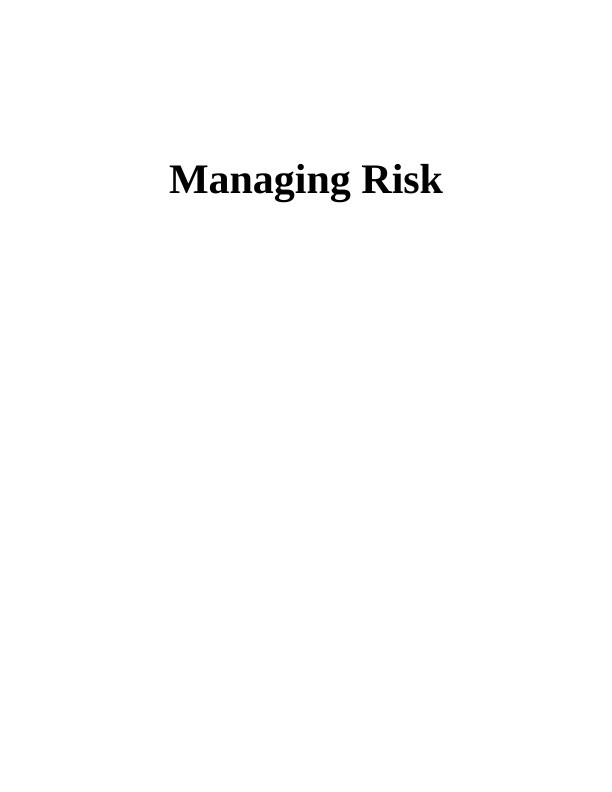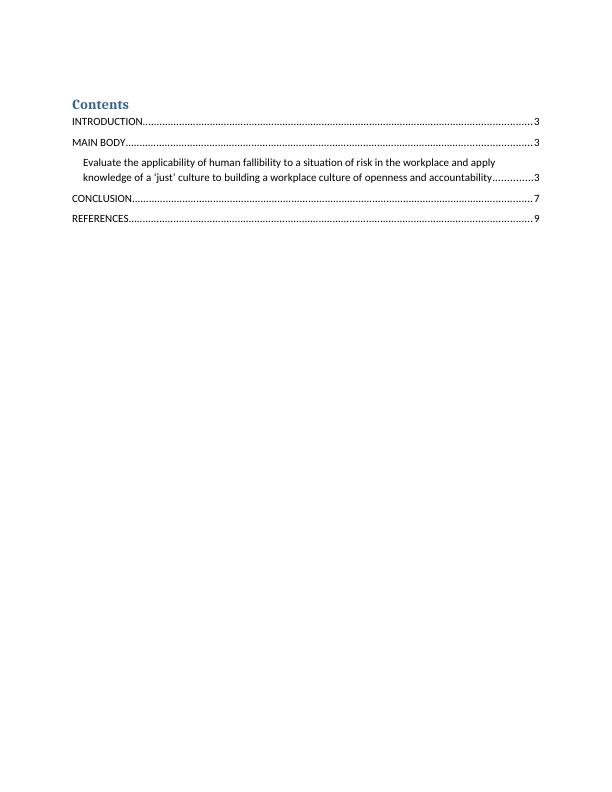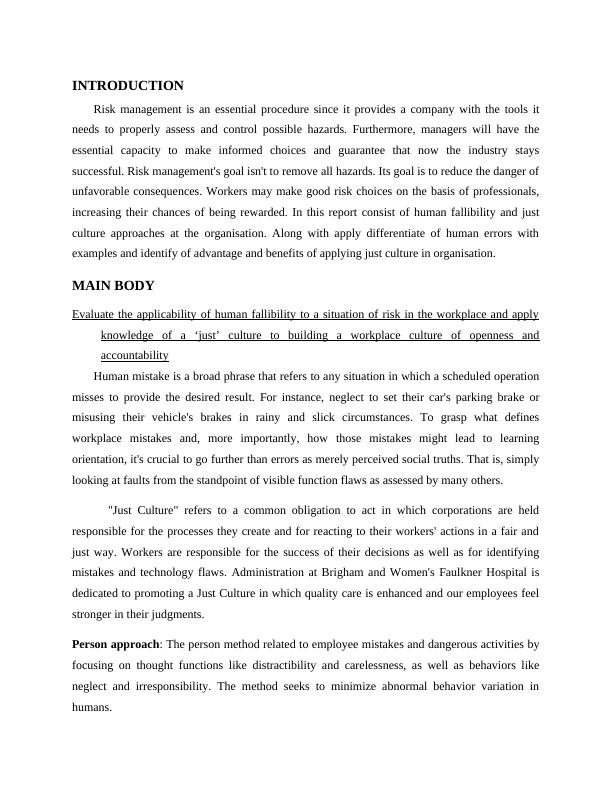Managing Risk: Evaluating Human Fallibility and Just Culture in the Workplace
Added on 2023-06-14
10 Pages2511 Words385 Views
Managing Risk

Contents
INTRODUCTION...........................................................................................................................................3
MAIN BODY.................................................................................................................................................3
Evaluate the applicability of human fallibility to a situation of risk in the workplace and apply
knowledge of a ‘just’ culture to building a workplace culture of openness and accountability..............3
CONCLUSION...............................................................................................................................................7
REFERENCES................................................................................................................................................9
INTRODUCTION...........................................................................................................................................3
MAIN BODY.................................................................................................................................................3
Evaluate the applicability of human fallibility to a situation of risk in the workplace and apply
knowledge of a ‘just’ culture to building a workplace culture of openness and accountability..............3
CONCLUSION...............................................................................................................................................7
REFERENCES................................................................................................................................................9

INTRODUCTION
Risk management is an essential procedure since it provides a company with the tools it
needs to properly assess and control possible hazards. Furthermore, managers will have the
essential capacity to make informed choices and guarantee that now the industry stays
successful. Risk management's goal isn't to remove all hazards. Its goal is to reduce the danger of
unfavorable consequences. Workers may make good risk choices on the basis of professionals,
increasing their chances of being rewarded. In this report consist of human fallibility and just
culture approaches at the organisation. Along with apply differentiate of human errors with
examples and identify of advantage and benefits of applying just culture in organisation.
MAIN BODY
Evaluate the applicability of human fallibility to a situation of risk in the workplace and apply
knowledge of a ‘just’ culture to building a workplace culture of openness and
accountability
Human mistake is a broad phrase that refers to any situation in which a scheduled operation
misses to provide the desired result. For instance, neglect to set their car's parking brake or
misusing their vehicle's brakes in rainy and slick circumstances. To grasp what defines
workplace mistakes and, more importantly, how those mistakes might lead to learning
orientation, it's crucial to go further than errors as merely perceived social truths. That is, simply
looking at faults from the standpoint of visible function flaws as assessed by many others.
"Just Culture" refers to a common obligation to act in which corporations are held
responsible for the processes they create and for reacting to their workers' actions in a fair and
just way. Workers are responsible for the success of their decisions as well as for identifying
mistakes and technology flaws. Administration at Brigham and Women's Faulkner Hospital is
dedicated to promoting a Just Culture in which quality care is enhanced and our employees feel
stronger in their judgments.
Person approach: The person method related to employee mistakes and dangerous activities by
focusing on thought functions like distractibility and carelessness, as well as behaviors like
neglect and irresponsibility. The method seeks to minimize abnormal behavior variation in
humans.
Risk management is an essential procedure since it provides a company with the tools it
needs to properly assess and control possible hazards. Furthermore, managers will have the
essential capacity to make informed choices and guarantee that now the industry stays
successful. Risk management's goal isn't to remove all hazards. Its goal is to reduce the danger of
unfavorable consequences. Workers may make good risk choices on the basis of professionals,
increasing their chances of being rewarded. In this report consist of human fallibility and just
culture approaches at the organisation. Along with apply differentiate of human errors with
examples and identify of advantage and benefits of applying just culture in organisation.
MAIN BODY
Evaluate the applicability of human fallibility to a situation of risk in the workplace and apply
knowledge of a ‘just’ culture to building a workplace culture of openness and
accountability
Human mistake is a broad phrase that refers to any situation in which a scheduled operation
misses to provide the desired result. For instance, neglect to set their car's parking brake or
misusing their vehicle's brakes in rainy and slick circumstances. To grasp what defines
workplace mistakes and, more importantly, how those mistakes might lead to learning
orientation, it's crucial to go further than errors as merely perceived social truths. That is, simply
looking at faults from the standpoint of visible function flaws as assessed by many others.
"Just Culture" refers to a common obligation to act in which corporations are held
responsible for the processes they create and for reacting to their workers' actions in a fair and
just way. Workers are responsible for the success of their decisions as well as for identifying
mistakes and technology flaws. Administration at Brigham and Women's Faulkner Hospital is
dedicated to promoting a Just Culture in which quality care is enhanced and our employees feel
stronger in their judgments.
Person approach: The person method related to employee mistakes and dangerous activities by
focusing on thought functions like distractibility and carelessness, as well as behaviors like
neglect and irresponsibility. The method seeks to minimize abnormal behavior variation in
humans.

End of preview
Want to access all the pages? Upload your documents or become a member.
Related Documents
Managing Change: Human Fallibility and Just Culturelg...
|10
|2996
|396
Managing Risklg...
|8
|2371
|66
Managing Risk: Evaluating Human Fallibility and Just Culture at Rolls Roycelg...
|8
|1851
|24
Managing Risk in the Workplacelg...
|9
|2831
|86
Managing Risk: Essay and Case Studylg...
|14
|4896
|71
Managing Risk in Genera Pharmaceuticallg...
|17
|5864
|79